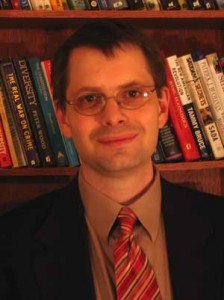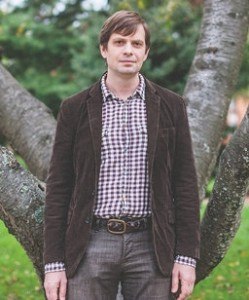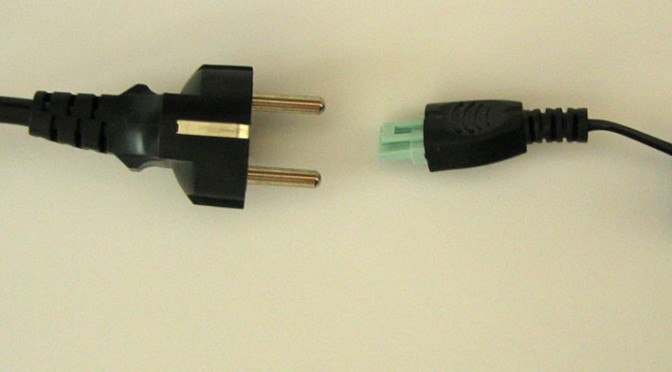In November 2012, Ian Jobling was interviewed by the Southern Poverty Law Center.
When Jobling shuttered his website in May 2010, Hunter Wallace provided a synopsis of Jobling’s brief race-realist-ish career in White America, R.I.P.:
The saga began in 2006 when Ian Jobling and Mike Berman broke with Jared Taylor over his refusal to anathematize anti-Semites to their satisfaction. This can be traced back to the infamous David Duke/Michael Hart confrontation at the 2006 Amren conference. In the wake of that incident, Jobling and Berman circulated a letter which condemned Duke and anti-Semitism. If memory serves, they were displeased with Taylor’s response and launched “The Inverted World” in protest.
Mike Berman quit the project early on because (of all things) The Inverted World was not philo-Semitic enough for his tastes. Jobling spent the next few years supporting the Iraq War and attacking various prominent figures in the pro-White movement. His website targeted David Duke, Jared Taylor, Kevin MacDonald, and Frank Salter.
In 2009, The Inverted World evolved in White America, which was the same project under a new name.
I disagree with Wallace’s final analysis:
There was nothing wrong with White America. Jobling’s problem was that he didn’t have the temperament to build a successful website.
Jobling’s problem, from a pro-White point of view, was that he was a dissembler and dissimulator. He waved a pro-“white” banner and tried to tell Whites what to do, while his main priority, all along, was to fight “anti-semitism”. From his time at AmRen onward Jobling was pretending to be something he wasn’t. He could have called his own web site “Support Jews America” or “Jew-First America”. That’s what he was about. The mainstream is full of such organizations. Jobling deliberately went outside the mainstream, striking a pose in opposition to “liberalism” and “leukophobia“, only to spend a great deal of his effort attacking pro-Whites who most cogently distinguish and explain the role played by jews.
I have commented on Jobling a few times, mostly in association with others who behave similarly, like Lawrence Auster and Guy White. Unamused is another more recent but less zealous example.
I described my last and most direct exchange with Jobling in The Urge to Purge, in October 2008.
Jobling saw race through a polarized, black/white lens. This is common in the race-realist, human biodiversity (HBD), men’s rights and black run America (BRA) spheres. Even in such places, where racial traits and conflicts of interest are often otherwise relatively freely discussed, many people simply refuse to think or talk about jews. Others more or less actively defend jews, and do so even when their interests conflict with Whites. Jobling was this latter type.
Jobling’s view of the relationship between Whites and jews went beyond simple blindness. As I alluded above, he wrote volumes about “liberalism” and “leukophobia”. He stared directly at Marx and Freud and others who have done and continue to do similarly destructive work. He even read and wrote about Culture of Critique. Yet somehow his self-imagined analytical mind and interest in human behavior could never accept any significant difference between Whites and jews, biological or otherwise.
Actually, that’s not entirely correct. Jobling did see a significant difference between Whites and jews. On his now defunct Inverted World/White America website, Jobling blamed Whites while excusing jews. At least some of the content is preserved at archive.org.
Principles of the Pro-White Movement is typical of Jobling’s dismal brand of “white” advocacy:
Carrying on the dismal tradition of American white supremacism, most pro-whites today believe our current racial dispossession is due to Jewish influence on the West, if not actual Jewish conspiracies against whites. However, these tired lies conceal the real dynamics of white dispossession, which has been inflicted by white Gentiles on themselves. While it is true that Jews have been inclined towards highly liberal—that is, leukophobic—beliefs, nevertheless more than 90 percent of white racial liberals are Gentiles. Moreover, that Jewish leukophobia could thrive in America suggests that it was a mere extension of something in our national character. For these reasons, the pro-white movement repudiates anti-Semitism and will resolutely oppose the obsession with Jews that poisons and discredits our cause.
The portion of the text emphasized above is the only portion of the entire essay Jobling so elevated.
Drawing a clear distinction between Whites and jews, Jobling claims that jews aren’t to blame for “our current racial dispossession”, because it is “inflicted by white Gentiles on themselves”. This is the suicide meme. Note the subtle inconsistency in Jobling’s use of “our” and “themselves”, as if he doesn’t see himself as a “white Gentile”. For a self-described pro-“white” who can’t bring himself to capitalize White, it’s odd that he cares enough to capitalize gentile.
His two links showcase an uncanny ability to look directly at the hostility of jews against Whites before dismissing it.
The “Jewish influence on the West” link takes you to Jobling’s cockeyed review of Kevin MacDonald’s Culture of Critique, Did the Jews Do It?:
Summarizing CoC is difficult, as it has two theses, one overt and one covert. The overt thesis is that a number of major 20th century intellectual and political movements—racial egalitarianism, Freudianism, Marxism, and advocacy of open borders—have been vehicles of Jewish ethnic interests. This thesis is supported by copious and convincing evidence. The covert thesis, which is never fully avowed or openly argued for, is much more ambitious. MacDonald would have us believe that Jewish activism is the major cause of the forces that he believes is bringing down the West: multiculturalism, mass non-white immigration, and the taboo against white racial identity. This thesis is manifestly implausible. MacDonald’s book is, in fact, an emotional, extravagant, and unsubstantiated indictment of Jews covered by a veneer of scholarship.
Jobling admits that MacDonald’s exposition of jewish hostility toward Whites is very convincing. He simply cannot accept it. At such a loss for an argument of his own he grabs the nearest one at hand. He takes the typical jewish intellectual behavior MacDonald so well documented and imputes it to MacDonald instead.
If MacDonald had confined himself to exploring the ethnic dimension of these movements, no reasonable person could object to his book. However, MacDonald’s real ambition is to convince us that the movements he discusses bear the majority of the blame for multiculturalism and all its attendant phenomena.
MacDonald introduces this agenda into the book through hints and implications, rather than overt argument. The sneaky, two-faced character of CoC is evident in his response to Paul Gottfried, who criticized MacDonald for laying excessive blame on Jews for the cultural changes in the West since 1950.
Here Jobling doesn’t act reasonable. The sneaky, two-faced character he sees is only a reflection of his own bias. MacDonald confines himself and Jobling still manages to get upset, even though he must claim to read MacDonald’s mind so he can do so.
Paul Gottfried is a jew who dissembles about jews, “whites” and “liberalism” in the same vein Jobling and Auster have.
There is a simple, but, I believe, devastating counter-argument to MacDonald’s theory. If the Jewish/Gentile dynamic that MacDonald outlines is rooted in these groups’ biological natures, and Jews have extensive powers to convert Gentiles to multiculturalism, why didn’t anything like multiculturalism emerge before the 20th century? Jews have been present in the West since Roman times, but Gentiles in medieval European societies did not believe in white guilt, nor did they think diversity was a strength, despite the presence of Jewish minorities—indeed, multiculturalism was not only non-existent in medieval Europe, it was unthinkable. That almost all Gentile societies containing Jewish minorities have remained strongly ethnocentric is evidence that Jews have little power to weaken Gentiles’ confidence in themselves.
Jobling never quotes MacDonald explaining MacDonald’s theory.
The main value in MacDonald’s work is in the facts he gathers and lays out – the names, dates and quotes – exposing historic hostility and aggression of jews against Whites. Those, like Jobling, who make a big stink about MacDonald’s motives or theories seem most intent on distracting attention away from what he documents.
Jobling’s implication that jews haven’t lobbied for special rights, or in favor of more general principles like pluralism, tolerance, equality, diversity (the hallmarks of modern multiculturalism), or that this never contributed to the collapse of the societies hosting them before the 20th century, is absurd. If he had looked a bit harder he could have found evidence for it in Rome (see particularly the bits about “jewish rights” and what Tacitus had to say). There have been copious examples in Europe since.
Before Rome and beyond Europe there were Babylon, Assyria, Egypt, Greece, Macedonia and more. A study of the history of people tolerating jews living amongst them teaches two lessons: 1) The jews can be counted on to do a good job looking after themselves, and 2) everyone else could do a better job.
The contemporary guilt-tripping of Whites is a case in point. It traces directly back to the emancipation of jews in Europe. The undoing of European rule over European societies proceeded apace once jews were granted equal access to citizenship and the ruling class. The cries of jews against “discrimination” and “hate”, openly aimed at Europeans as early as the late 1700s, are echoed today in the service of every other imaginable “oppressed” “minority”.
The tendency to blame Whites, which Jobling noted in his SPLC interview, began in earnest only after the jews were emancipated. Jews have consistently blamed Whites for every problem created by their integration, and before. The basic mechanism is still the same today. The use of “racism” as shorthand for “Whites are to blame” is simply a generalization of how jews, and Jobling, use the term “anti-semitism”.
Jobling’s second link, “Jewish conspiracies against whites”, takes you to his article, The Insanity of David Duke.
What Jobling actually tries to explain is why he thinks “the racial right in America is fundamentally insane” using “the worldview of David Duke”. The most important part of that worldview, from Jobling’s point of view, is what he describes as Duke’s “theory that Israel was complicit in the 9/11 attacks”. (The only surviving link to Duke is How Israeli terrorism and American treason caused the September 11 Attacks.)
It would be easy to prove that this theory is merely wrong, but I am making a much stronger claim: that this theory is the product of a mind that has lost touch with the principles of reason, a mind that is so maddened by hatred of Jews that it obsessively and irrationally twists everything that it dislikes about the present and the past into evidence of Jewish evil. Because Duke is so popular with the racial right, his views are a good indication of those of the broader community.
Once again Jobling goes on the warpath, not against the facts or Duke’s arguments, but against his own theories, projecting his own maddened hatred onto Duke. He is so disturbed by Duke that he does not try to address what he says directly. He just wants to blot him out. Losing touch with the principles of reason he irrationally twists what Duke argues into evidence that the entire “racial right in America” is fundamentally insane.
Here and elsewhere Jobling regularly “proved” things that were clearly a matter of opinion – usually what he proved was that his opinion about someone else’s opinion was worthless.
Turning now to what Jobling had to say in his SPLC interview, we find that one reason he finally gave up his pro-“white” schtick is that he just couldn’t abide Whites having the kind of nationalism jews have:
In the wake of 9/11, there were a lot of people saying the U. S. was at fault for the attacks, that they were somehow justified by U.S. policies toward Israel. I didn’t buy that argument. And that’s why I got the idea that everyone blamed whites first — that there was an inclination to blame white people even though a non-white was to blame.
A part of white nationalism that I really never bought into but I just sort of agreed with because of the people around me is the idea of ethnonationalism — that it’s natural for people to align with their own race and to work in their own race’s interests. And if you don’t do that, there’s something wrong with you and if you don’t defend your own race’s interests, you’re just going to be victimized by other races because those other races have it together, right? The idea is we are organized by race and we all are meant to work in our race’s interest.
So this is really the heart of white nationalism and the major scholarly exponent of this idea today is Kevin MacDonald. And also J. P. Rushton. And Taylor was popularizing these wrongheaded ideas.
A major source of contention between us [Jared Taylor and Jobling] was the Iraq War. I was a supporter, which may well have been the wrong position. I basically bought into the Bush administration’s line. I believed in the idea of trying to establish a liberal democratic nation in Iraq.
Taylor doesn’t believe in those ideals, not at all. He took this very simple-minded nationalist viewpoint, that we should allow other nations their sovereignty. I always basically agreed with liberal democratic ideals. My concerns about non-white immigration were that immigrants did not believe in those ideals, so we needed to retain a white nation so we can go on being a liberal democracy. That was very, very different from what Taylor believed.
To my knowledge Jobling has never criticized jewish nationalism, and here we see his test drive with “white” nationalism was based on support for Israel and his view of jews as “white”. Ultimately however, he just “never bought into” nationalism for anyone but jews.
Jobling tried to argue that jews were really just like any other White ethnicity. As time went by it must have become as clear to him as it already was to many of the people arguing with him that the truth is the opposite. The modern “liberal” “leukophobic” democracy Jobling says he likes so much treats jews and Whites to different standards. In particular, nationalism for jews is treated completely differently from the nationalism of any European ethnicity.
France for the French is a perfectly reasonable statement most Whites would agree to without a second thought. But as Ian Jobling, the SPLC, and most jews will tell you, France for the French is nothing but a “far-right”, “racist”, “xenophobic”, “nazi” concept. If it means jews can’t hold any office and come or go as they please then it’s also unthinkably “anti-semitic”. At the same time, if you want to be US Secretary of Defense you must say you support Israel as a jewish state.
This undeniable reality completely undercuts Jobling’s core claim that jews are “white”, no different from the rest of us Whites. When push came to shove, Jobling gave up on both nationalism and “whites”. He goes on supporting Israel and jews.
What might motivate a man to argue and behave as Jobling does? There are some hints in his SPLC interview:
I grew up in Louisville, Ky. My mother teaches history and women’s studies at the University of Louisville. My parents divorced in 1974 and my father moved up to Canada, where he taught at a seminary. I went to the best private school in Louisville. Then I went to Amherst College.
My involvement with American Renaissance was incredibly hard on my family relationships. I still see my mother and father, but with my mother’s family, there was so much conflict there that I just stopped seeing them.
Both my parents, I think, did rather well about this. And chose to ignore it. The problem is hard — seriously disagreeing with a family member. Can they put that disagreement aside, to save the rest of the relationship? And both my mother and father managed to do that, [to] compartmentalize and segregate this whole problem. And they did manage to treat me as a son.
My mother’s family was obsessed with sorting out my life, however. They couldn’t get over it. It made for some very rough times and very snarky, hostile Thanksgivings.
Jobling never exhibited any religious basis (e.g. a Christian or Christian Zionist ideology) for his behavior. The impetus appears, by his own account, to come from within his family. Jobling’s description of his extended family, especially on his mother’s side, includes some characteristically jewish traits: academic, snarky, obsessed with sorting out his life, ultimately unable to get over his “white” activism.
It’s likely Jobling is at least partly jewish. Whether he is nor not, Whites probably haven’t seen the last of him, or for that matter, more like him. If Jobling does once again sally forth, nobody should be surprised if it’s to carry on the one consistent ambition he has always had – to fight for the jews.






